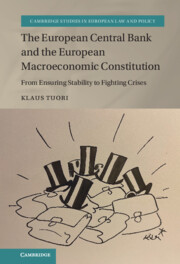 The European Central Bank and the European Macroeconomic Constitution
The European Central Bank and the European Macroeconomic Constitution from Part I - The ECB as the Central Bank of the European Macroeconomic Constitution
Published online by Cambridge University Press: 15 September 2022
The chapter analyses the three foundations of the new EU framework for macroeconomic governance, the European Macroeconomic Constitution. The provisions of the Maastricht Treaty stem from a rich background that informs about the content of the provisions and how they were assumed to lead to a successful monetary union. First, the economic constitutional thinking, originally by the German ordoliberal can be considered the philosophical foundation that informs how and why constitutional law addresses economic issues, particularly the monetary order. Second, longer evolution in central banking on one side and development in macroeconomic and monetary theory on the other side form the economic foundation. It informs about the assumption and content of various economic concepts and particularly about the 1990s broad consensus on central banking economics. Third, the institutional foundation is built on the institutional, legal and political development of the Community towards the establishment of the EMU. In the early 1990s, these three foundations happened to meet at the same intellectual crossroads that made EMU possible.
To save this book to your Kindle, first ensure [email protected] is added to your Approved Personal Document E-mail List under your Personal Document Settings on the Manage Your Content and Devices page of your Amazon account. Then enter the ‘name’ part of your Kindle email address below. Find out more about saving to your Kindle.
Note you can select to save to either the @free.kindle.com or @kindle.com variations. ‘@free.kindle.com’ emails are free but can only be saved to your device when it is connected to wi-fi. ‘@kindle.com’ emails can be delivered even when you are not connected to wi-fi, but note that service fees apply.
Find out more about the Kindle Personal Document Service.
To save content items to your account, please confirm that you agree to abide by our usage policies. If this is the first time you use this feature, you will be asked to authorise Cambridge Core to connect with your account. Find out more about saving content to Dropbox.
To save content items to your account, please confirm that you agree to abide by our usage policies. If this is the first time you use this feature, you will be asked to authorise Cambridge Core to connect with your account. Find out more about saving content to Google Drive.